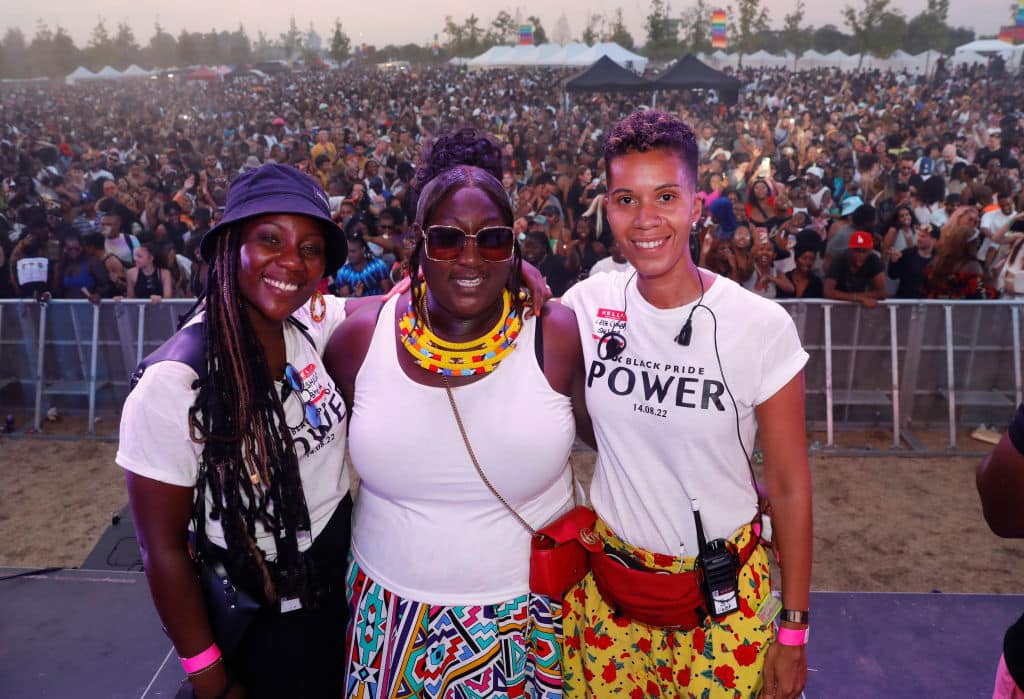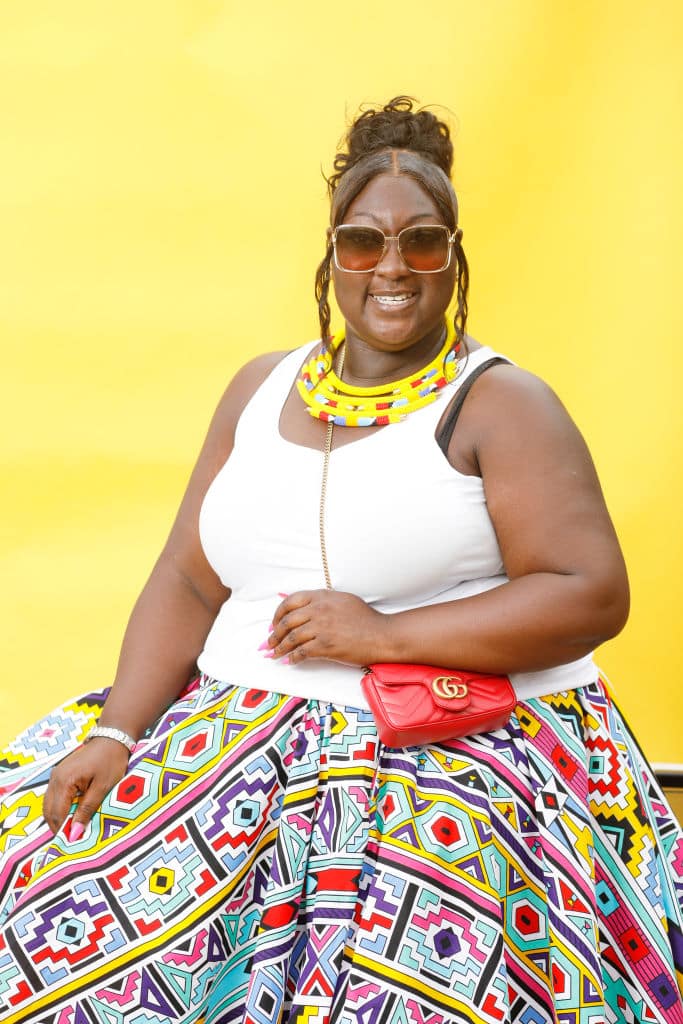Lady Phyll on choosing action over words and the priceless lessons she’s learned

Phyll Opoku-Gyimah speaks her mind at this year’s Kaleidoscope Trust Gala dinner. (Getty/John Phillips)
Lady Phyll is queer Black history in the making.
In 2005, Phyll Opoku-Gyimah became co-founder of the first-ever UK Black Pride in Southend-on-Sea.
While the event has grown in stature over the years – since becoming the world’s largest Pride event for African, Asian, Middle Eastern, Latin American and Caribbean-heritage LGBTQI+ people – at the beginning, it was met with resistance.
“Seventeen years ago, there was no space for UK Black Pride, they said that it’s a separatist organisation, that we shouldn’t be doing this,” she tells PinkNews.
Through assertive, intentional and defiant perseverance, Lady Phyll co-created an event that this year was attended by more than 25,000 people.

Lady Phyll with guests at UK Black Pride 2022. (Getty Images for UK Black Pride/Tristan Fewings)
Somehow, she also finds the time to serve as executive director of Kaleidoscope Trust, which advocates for LGBTQ+ rights across the commonwealth, where British colonialism shaped anti-LGBTQ+ laws that exist to this day, and to support young Black LGBTQ+ people in other ways.
When PinkNews speaks with Lady Phyll, she’s on her way to speak at a BYP Network event – a conference to connect and inspire the next generation of young Black working professionals, which took place during Black History Month. She reflected on the origins of UK Black Pride, the things she wishes she knew when she was starting out, and her advice for Black people in the workplace.
PinkNews: The theme of this year’s Black History Month is “time for change: action, not words”. Can you recall a time when you chose action over someone who was only offering words?
Lady Phyll: I think people offer lots of words with no substance or action behind it. And sometimes underrepresented groups settle for those words. But in my own career, I have had to call out and also call in people to let them understand that this is not about settling.
One example that I can give you is the very space in which we celebrate UK Black Pride. We wouldn’t settle for their words of: “You can join the regular Pride.” We ended up creating something by us and for us. And the action behind that was intentional. It was unapologetic. It was direct, it was assertive, it was bold and it was brave.
Because we knew that when you take action there’s always going to be populations, groups of individuals, that don’t believe you should be doing what you’re doing. But when you know that you’re on the right side of history, you don’t just want frivolous, fluffy words – you want action which is about meaningful change for communities. You go forward with that.

Lady Phyll, co-founder of Black Pride. (Getty Images for UK Black Pride/Tristan Fewings)
What is something you know now that you wish you knew as a young professional starting out?
I wish that I had even more people around me that could hold me up when I felt low. Make sure that you have the right people around you to hold you when times are hard. I know in a professional setting that often feels difficult, because some of us may be working in spaces that don’t always feel safe. What I would say is that there are other networks. We’re at this [BYP] conference. Link arms, connect.
A lot of companies are working to be more inclusive. Sometimes it’s genuine, sometimes it’s not. What advice would you have for a company that says it wants to be inclusive?
I think for companies that want to be inclusive, they have to understand that intersectionality is not just a buzzword. I think that we should have organisations that also want to see joy, that want to see positivity and want to see growth in ways that’s not tokenistic and that is not performative.
If you’re in one of these organisations, look at what the strategy says. I always believe that we should be able to rock the boat – otherwise, we don’t make change. But do it without putting yourself in harm’s way. You’ve got to be able to have your voice heard because there’s bound to be somebody in the organisation that will listen to you. But if you have entered into an organisation where you are not listened to, not valued and they have no mission, then I would seriously consider taking your expertise, and your knowledge, and your power to somewhere that will respect that.
I say that now as somebody who is getting to a grand old age of 50. I wish I would have had that confidence to take myself out of certain situations in the workplace. To say: I don’t need to accept your BS. Yeah, I actually am really bloody good at what I do. And I know somebody will value me.
How can Black colleagues take better care of each other?
Oh my gosh, there’s something about collective strength and collective voice. When we see each other and we know each other, we have to be able to hold one another. This is not about trampling on one another just to get to the next position. We’ve got to be able to hold each other in the organisation so we can hold senior leadership to account. And understanding accountability is key for us when we do come together to speak about what we need, what our dreams are, what our hopes and our aspirations are.
How would you advise Black professionals to hold people in senior positions accountable?
I think that when you want to talk about accountability, you have to use some of the same metrics which are placed within the organisation. To say: OK, this is the way we are accountable as junior members of staff. Or, who are seniors accountable to? Because that’s a question we cannot avoid answering. As a senior leader in my own organisation, who am I accountable to? Many people. And I have to answer that truthfully. I will also explain the ways in which I am accountable. So putting people on the spot in ways that don’t feel like a conflict, that doesn’t feel argumentative.
Do you have any advice for young Black people trying to take care of their spiritual health in a place that doesn’t value spirituality?
Please make sure self-care is not an afterthought. It’s something that has to be done beforehand. And make sure that you’re taking your breaks, drinking your water, staying hydrated and finding something that makes you feel warm and good about who you are. Easier said than done. But practice makes perfect. Let’s not do self-care after we feel broken.

